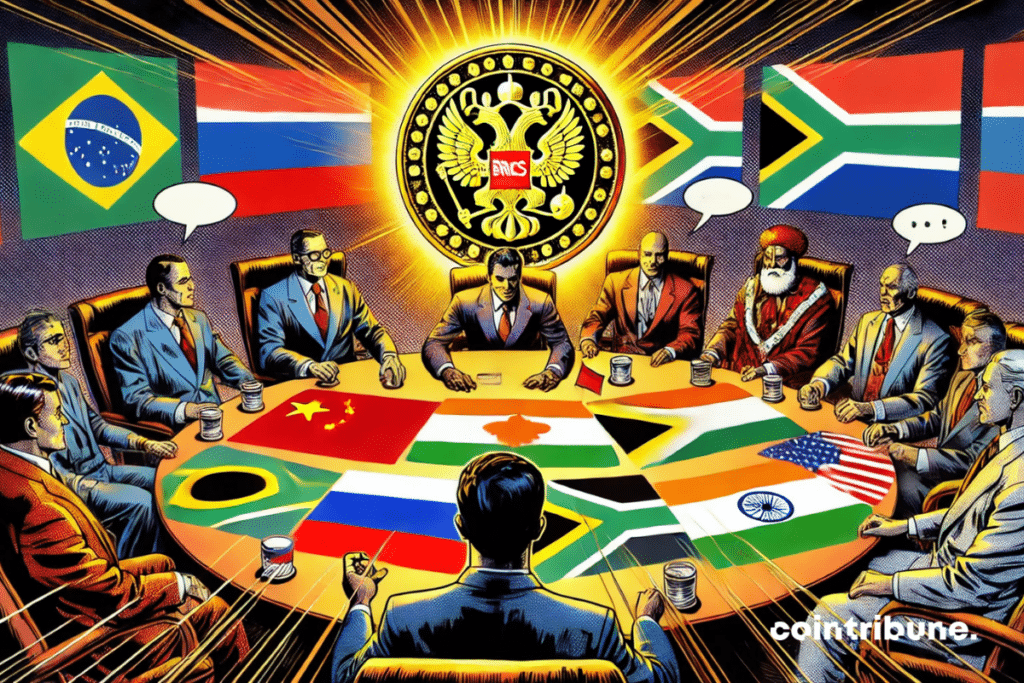BRICS Turn To Gold In Face Of US Dollar Dominance
In the face of the intensification of global economic tensions, the central role of the dollar in international trade is increasingly being called into question. At the heart of this upheaval, the BRICS nations are seeking to free themselves from this dependence by exploring alternative solutions. According to economist Jim Rickards, these countries already have a common unofficial currency: gold. This discreet yet strategic approach allows them to circumvent the financial pressures exerted by the United States, particularly through economic sanctions. As the United States intensifies the use of the dollar as a geopolitical weapon, the BRICS present a resistance that could redefine the rules of global trade. This strategy raises questions about the future balance of the international monetary system.

The BRICS, between economic pressure and monetary innovation
Jim Rickards, a recognized economist and author, claims that the BRICS do not need to create a single currency to facilitate their commercial exchanges. In his view, gold already fulfills this role, as the precious metal acts as a common unofficial currency within the bloc. This statement was made during an interview broadcast on Bannon’s War Room on December 3, 2024, a channel hosted on the Rumble platform.
The use of gold by the BRICS fits into a context of increasing pressure exerted by American economic sanctions. Indeed, the United States uses the dollar as a tool of political influence, prompting countries like Russia to establish alternative mechanisms to maintain their trade relations. These measures include bilateral transactions in national currencies, such as the yuan or the ruble, periodically balanced by payments in gold. According to Rickards, this strategy offers an effective and pragmatic solution, allowing the BRICS to free themselves from institutions dominated by the dollar, such as the SWIFT system.
This model is not only a functional alternative, but it also poses a strategic challenge for the United States. Rickards even advises the U.S. Treasury to bolster its own gold reserves to counter this dynamic: “If I were at the U.S. Treasury, I would start buying gold to complicate their task,” he indicates. This observation underscores how the BRICS’ approach could alter geopolitical and financial balances in the long term.
Gold, a strategic lever against dollar dominance
Jim Rickards goes further and even describes American economic sanctions as an “act of war.” According to him, these coercive measures have a profound impact, forcing the BRICS to intensify their economic collaboration and reduce their dependence on the dollar. He specifies that these countries do not necessarily wish to abandon the American currency but are constrained by what he calls its “militarization” through sanctions and financial restrictions. This context has led BRICS members to consolidate their alternative mechanisms, particularly the use of gold, which they see as a timeless and reliable store of value, immune to geopolitical fluctuations.
The strategic importance of gold in this configuration cannot be underestimated. Historically used as a monetary stabilizer, gold could regain a central place in the global financial balance if this trend persists. Rickards anticipates that this approach could profoundly restructure international exchanges, favoring bilateral agreements and settlements in tangible assets, away from dollar-dominated systems. This initiative could also inspire other economic blocs to explore similar solutions, thereby amplifying pressure on dollar hegemony. For the United States, this development constitutes a major challenge and illustrates the limits of a policy based on sanctions that reveals the risks of excessive dependence on their currency in global trade.
The strategy adopted by the BRICS embodies a significant opposition to the monetary dominance exerted by the United States. Through gold, these nations demonstrate that there is a pragmatic and credible alternative to circumvent the restrictions imposed by American economic sanctions. This strategic choice goes beyond responding to immediate challenges. It fits into a long-term vision aimed at redefining the foundations of international exchanges. This dynamic provokes growing global interest. If this approach were to become widespread, it could lead to a reconfiguration of economic alliances and monetary systems.
Maximize your Cointribune experience with our "Read to Earn" program! For every article you read, earn points and access exclusive rewards. Sign up now and start earning benefits.
Diplômé de Sciences Po Toulouse et titulaire d'une certification consultant blockchain délivrée par Alyra, j'ai rejoint l'aventure Cointribune en 2019. Convaincu du potentiel de la blockchain pour transformer de nombreux secteurs de l'économie, j'ai pris l'engagement de sensibiliser et d'informer le grand public sur cet écosystème en constante évolution. Mon objectif est de permettre à chacun de mieux comprendre la blockchain et de saisir les opportunités qu'elle offre. Je m'efforce chaque jour de fournir une analyse objective de l'actualité, de décrypter les tendances du marché, de relayer les dernières innovations technologiques et de mettre en perspective les enjeux économiques et sociétaux de cette révolution en marche.
The views, thoughts, and opinions expressed in this article belong solely to the author, and should not be taken as investment advice. Do your own research before taking any investment decisions.